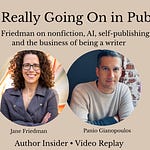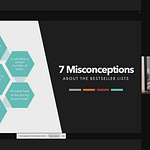Last month, Stephen Witt published The Thinking Machine: Jensen Huang, Nvidia, and the World’s Most Coveted Microchip.
It may be the last conventional book he ever writes.
I recently interviewed Stephen for The Next Big Idea, and he told me, a note of tragicomic wistfulness in his voice, that o3, the latest model from OpenAI, is “right on my rear end, if not better than me already.”
But that doesn’t mean he’s about to throw in the towel. Writers, he believes, won’t disappear so long as they can adapt — much like silent film directors had to reinvent their approach to storytelling when the talkies arrived. The book won’t go extinct; it will evolve, in Stephen’s view, from “static printed document” to “interactive knowledge database.”
The following (lightly edited) excerpt from our conversation — exclusively available to readers of Author Insider and not included in the podcast — reveals Stephen’s exciting and, dare I say, optimistic vision for what authorship might look like in an AI-dominant future.
Support Author Insider by becoming a paid subscriber. You’ll gain access to our archive of interviews with folks like Susan Cain, Daniel Pink, Morgan Housel, and Gretchen Rubin. And if you become a Founding Member, you can attend our upcoming virtual conversations with Seth Godin, Christy Fletcher, and Sarah Fay.
Rufus Griscom: AI is becoming an increasingly effective researcher and writer. You said recently that you’re feeling better on this front. Why are you feeling better?
Stephen Witt: I’m not, actually — that was a momentary respite. I would use GPT-4 when I was writing The Thinking Machine. My approach was to feed it five or six paragraphs of text that I had written and then ask the LLM to write the next paragraph. It would write a paragraph, but the tonal shift was so obvious between my writing and its writing that there was no way I could use it or even massage it into what I wanted. So, at least for this book, I didn’t use an LLM to write it.
ChatGPT-o3 is the latest model from OpenAI. God, it’s good. It’s right on my rear end, if not better than me already. It really writes some nice prose. It doesn’t feel mechanical or clichéd the way that GPT-4 did, especially if you coax it with the right prompt.
But you have a thesis about the future of the book?
Right. So what’s my role now? If this thing can do what I can do reasonably well, what am I doing? For this book, I did something like 200 hours of interviews. And of that 200 hours, maybe one percent makes it into the finished product. Why does that happen? Well, I have to decide who I’m writing for. I have all this technical information that might interest an engineer, financial data that might interest an investor, and personal data that might interest the person who wants drama from Jensen Huang’s life. How do I strike the appropriate balance? What goes in and what comes out? I’m constantly having to guess who the reader is.
But what if I didn’t have to? What if the reader came to me and said, “I’m a microchip designer with ten years’ experience,” or “I’m a boomer, Nvidia stock is in my portfolio, and I don’t even know what they do,” or “I’m a teenager, and I want to be the next Jensen.” And then AI took that query and wrote the book based on the knowledge database that I constructed on the fly. What if the AI created a bespoke book for those individual readers, tailored to their reading habits and particular concerns? And then maybe there’s a little variety or spice in there that brings them a few things that they didn’t know they wanted but that I think are important. Now the book is not a static printed document but an interactive knowledge database. And you can also imagine this happening with audio.
I think I have to move in this direction, because if I don’t, o3 can do my job for me. I have to embrace what’s going on here and push it toward some new frontier. And so I think the book is going to evolve.
How does this change the practice of writing?
It completely shifts. In a certain way, I’m not even a writer anymore. I’m a new kind of journalist or a new kind of reporter — an AI-enabled reporter or journalist.
Let’s say I start getting some subscribers, and a lot of people are like, “Hey, we’d like to know more about the development of CUDA,” or “Hey, I’m willing to pay you more to report on this specific thing.” The book might be an eternal project that I work on. I mean, so much has changed since it was published — with Trump, with tariffs. There are so many questions people have about that. I’ve done reporting, but it’s not in the book.
And so the book becomes a living knowledge database or a living document that’s constantly updated with new information that I can provide with the context that I have within Nvidia and elsewhere in this industry. That feels like a new model, and it feels exciting. I think it would be fun to do that. Some of the artistry of being a writer would go away, and that’s sad. I do like that part. It’s always been my passion. The reporting stuff often came second. But if a machine can do it better than me, then I don’t know what to say.
Although your imperfections, Stephen, might be charming in this future world.
There’s more to that than you might think. Think about this: Chess players were eclipsed by AI in the nineties, right? And yet today there’s more demand to watch humans play chess than ever before. So maybe attaching a human face to this stuff is important. I think people are interested in the personality, not just of the book, but also of the writer. It’s one of the reasons I felt comfortable actually breaking the fourth wall in this book, because the era where the reporter is an anonymous gray figure who reports in this third-person, omniscient perspective — that was never true in the first place, but I think it will be increasingly exposed in the era of AI and will become economically unviable as personality will become more valuable.









